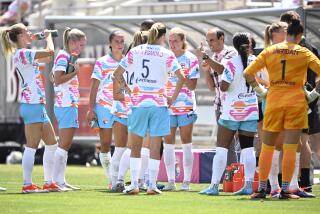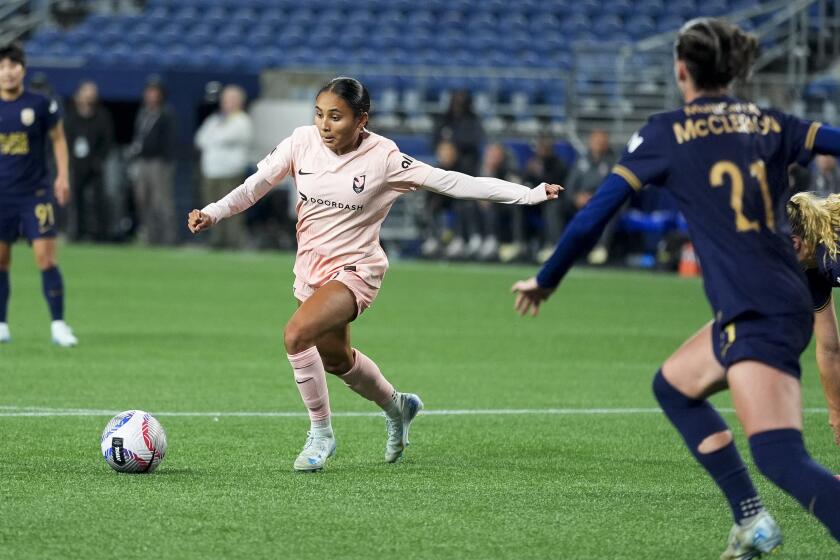Next Stop: Atlanta : U.S. Olympic Soccer Coach Liekoski Picks Up Where World Cup Team Left Off
- Share via
Imagine having spent two years in the Finnish army and then coming to United States at age 20 to find a new life.
And getting drafted within a month of setting foot on American soil.
And spending the next two years in the U.S. army.
And not so much as blinking an eye in protest.
In 1964.
During the Vietnam era.
Unthinkable?
Not for Timo Liekoski. For the unflappable Finn, it was merely another step on a long and curious road that took him this month to an appointment as coach of the U.S. Olympic soccer team for the 1996 Atlanta Games.
At 52, the circle had been completed.
“In Helsinki, I lived right next to the Olympic Stadium,” Liekoski said, impressed by the apparent symmetry of his appointment.
Liekoski was 10 when the 1952 Games were staged in his home city. His memories of them are remote. He has clearer recollections of summer evenings playing goalkeeper on the soccer field or winter afternoons playing forward on the ice hockey rink.
Then came 1964.
Thirty years have passed, but Al Miller remembers when he first saw Liekoski.
Miller, then a future North American Soccer League and U.S. national team coach, was playing amateur soccer for a club known as the Kingston Kickers.
“I was the captain,” Miller said, “and one night I saw him standing on the sideline and I went over and asked him if he’d like to join us.
“He said he was a goalkeeper. He was a great addition to our team. He was a nice kid. I started chatting to him, asked him what he was doing in America.
“He said he was looking for a job. He was working part time at a (Catskills) resort as a dishwasher or some damn thing. I said ‘Why don’t you go to college?’ and he said he’d love to but he didn’t know if he could get in.”
Turns out he could.
Miller, who was coaching at New Paltz (N.Y.) State University, soon had a promising goalkeeper on his freshman team.
But Liekoski wanted to be more than promising.
“He came to me during the summer and said, ‘I really want to be great goalkeeper, can you help me?’ ” Miller said. “So for two hours a day we trained in the heat of the summer and I killed him. I can still see him leaning over in the showers, just dead. He started turning out to be something.
“Timo had great reflexes. He was born with them. He was slow as a runner, but unbelievably quick over a step. So he was a natural for goalkeeping.”
In the fall, however, Miller got his first big coaching break at Hartwick College in Oneonta, N.Y., a school that takes soccer seriously.
Miller took three players with him: Liekoski, Terry Fisher and Alek Papadakis. At Hartwick, the trio met Francisco Marcos and the odd chemistry of Finn and American and Greek and Portuguese sparked something into life.
Miller went on to become one of the NASL’s top coaches and U.S. national team coach.
Fisher became coach of UCLA and later the NASL’s Los Angeles Aztecs, among other teams.
Papadakis became a starter with the NASL’s Atlanta Chiefs.
Marcos held various administrative posts in the NASL and today is commissioner of the 72-team U.S. Inter-regional Soccer League.
And Liekoski, well, Liekoski went farther than any of them and still is pulling ahead.
“I don’t believe there was anybody probably more destined to become a top-level coach, more determined, more dedicated or more analytical, than Timo,” Fisher said.
“Nobody deserves it more than he does. He paid the high price of not only staying with the program but surviving when the program wasn’t there for him. Now, he has the unique challenge of being the Olympic coach, and it’s well deserved.”
Miller saw the promise early.
“I did summer camps in those days,” he said, “and Timo helped. He was quiet but he had a great sense of humor and worked hard. He was great with kids. I always told him, ‘You’re going to make a great coach someday,’ and he said, ‘I think that’s what I’d like to do.’ So he was kind of studying it all along.”
At Hartwick, Liekoski sat out a year, played two years as a goalkeeper and then, during preseason camp in his senior year, broke his wrist during practice.
It didn’t slow him. He switched to defender and earned All-America honors that season.
But, as even his closest friends admit, he was not likely to have become a professional player.
“I would have to say that he was methodically skillful,” Fisher said, choosing his words with care. “I don’t think that skill was ever his biggest strength, but he was very determined, as well as a super-fit athlete, a great competitor. He was a tremendous goalkeeper.”
Marcos concurs.
“He was a very good player at a certain level,” he said. “I mean, he would never have been a star because he was not fast, but he was a very good tactician. He overcame whatever he couldn’t do because of lack of ability or speed, by very good positional sense.
“I think that he was earmarked to become a coach from the word go.”
Liekoski earned his bachelor’s degree in economics at Hartwick and later his master’s in education at Whittier College, but by then soccer had him hooked.
In 1973, he set out on a coaching career that already has lasted more than two decades and has seen him enjoy success on the collegiate level and professionally indoors and out.
But despite these achievements, it was not until Bora Milutinovic became U.S. national team coach in 1991 that Liekoski’s fortunes rose higher still.
They made an unlikely pair, the Yugoslav and the Finn. Milutinovic is an extrovert, always laughing, always seeking the limelight; Liekoski is an introvert, seldom smiling, always analyzing everything from a distance.
It is typical of Liekoski that he is able to view the relationship from Bora’s perspective.
“(Bora) had to approach it (having American assistant coaches forced upon him) with a certain degree of skepticism because he didn’t know if we would get along, if we would be loyal to him, or if we knew anything about the game,” Liekoski said.
“He was just sort of asked to make sure the American-educated coaches had a chance to spend time with him and learn from him.
“I think our relationship has evolved to the point where he’s got complete trust in me as a coach and as a friend.”
Miller, who has known Liekoski about as long as anyone in the United States, is perhaps best equipped to describe both his personality and his ability.
“His exposure to Bora and to the World Cup have been very good for him in terms of his international knowledge,” Miller said. “He is very thorough and very bright. He’s a very intelligent man. Extremely persistent. Every team he’s coached professionally has been very well coached. You could look at it and you could see him in it. He’s just very meticulous. He knows what he wants to get and he gets it from his players.
“He’s very quiet. He’s a very deep personality. I would say he’s a Jekyll and Hyde. You get him out at a banquet and he’s funny as hell, he’s a very good speaker. (But) when you meet him, he’s an enigma. . . . . He’s very into himself and very introverted and everything else, but get him at a banquet and he’s fabulous.”
Marcos echoes the thought and adds another angle.
“If you don’t know Timo, you would just sort of say, ‘What planet did this guy land from?’ Because he basically doesn’t smile, he doesn’t give the outward appearance of being the friendliest type. . . . He’s very tenacious. We all know about his competitiveness. With Timo, the fire rages within, but if you don’t know him, you don’t know that.”
“He and Bora were the perfect antidote for each other. It was a friendly cat-and-mouse situation. They could become each other’s confidante, in a way. Rather than having two guys who were totally alike, I think they were sounding boards for each other.”
“Clearly, Bora was very comfortable with it because it was Bora’s decision (to have Liekoski named Olympic coach). He realized, ‘Here’s somebody I can trust professionally, he’s been around enough, he won’t threaten my authority, but he’s not afraid of speaking his opinion, he’s not a yes man.’ ”
According to UCLA Coach Sigi Schmid, another of Bora’s World Cup assistant coaches, Liekoski’s almost encyclopedic knowledge of the world game makes him an invaluable asset.
“Timo is one of the American coaches who is very aware of the international soccer scene,” Schmid said. “That’s one area where sometimes the American coach is weaker. Certainly, the World Cup experience helped all of us have an international awareness, but I think Timo, along with a couple of others, was always aware of the international game.
“His videotape library is unbelievable. I remember when he was living in Mission Viejo he tried to catalogue them and I think he stopped at about No. 400 and something. And a lot of the tapes have two or three games on them.”
Because of the demands of his job, Liekoski’s interests outside the game are limited.
“When I lived in Edmonton,” he said, “I went to every (Oiler) game I could. I had season tickets. That was when they had (Jari) Kurri, (Mark) Messier, (Glenn) Anderson, a great team. So it was fun. When we were in L.A., I played in an old-timers’ hockey league twice a week in Costa Mesa. I’m debating whether to go back to my old team here in Cleveland, but I may not have time to do that.
“I like to follow the (Cleveland) Browns, but I haven’t been able to watch too many games because it just so happens that every Sunday I like to watch the Italian League.”
“I like to play golf when I get a chance (He has a 12-handicap.). I like to hack around; I enjoy it. Obviously, I do some exercising. I try to keep fit because I think it’s important that I be able to play with the players.”
Just who Liekoski’s Olympic players will be, the next 18 months of camps and tryouts and overseas tours will help determine.
The challenge of building a team that can contend for a medal is considerable, but Liekoski believes he has made the correct decision.
“Bora and I talked about it quite a bit,” he said, “and both of us felt the best scenario was for him to stay with the national team and for me to take the Olympic team.
“Then, hopefully, after the Olympics, he and I reunite and I continue as his assistant and prepare for France (and the 1998 World Cup). After that, who knows?”






